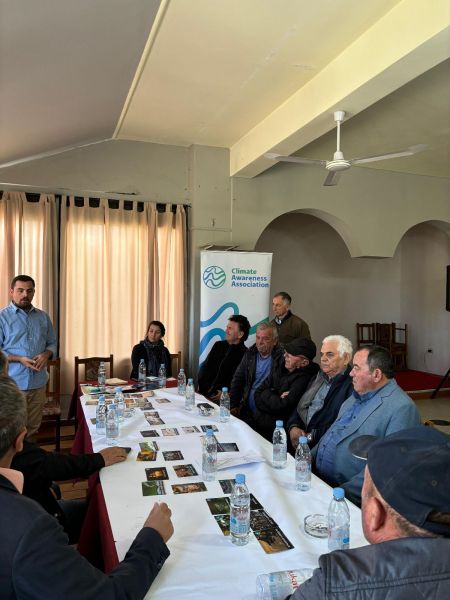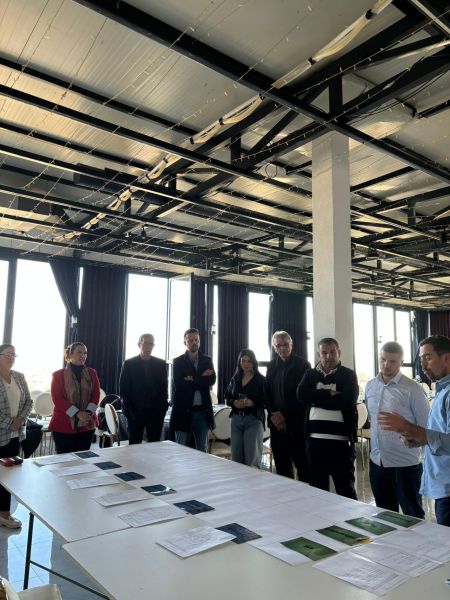A Journey through 6 countries
Following the “Agro-Ecological – Biodiversity – Climate – Balkans” project and the encounters of Skopje, we started this summer the Agro-Ecological Territories for Climate Action. This action is carrying out with Climate Awareness Association (CAA) in Kosovo and Zeleno Doba (Center for Sustainable Growth and Development Green Age) in Serbia.
Our objectives are:
- to animate the ABC – Balkans plateform, the Regional network, by continuing the virtual seminar,
- to build and test a climate/biodiversity awareness training for “territorial mediators” relevant for each territory,
- to run the climate/ biodiversity awareness training for Agroecology territories in the 6 Western Balkan countries.
CAA manages the training in Kosovo, Albania and North Macedonia, and Zeleno Doba in Serbia, Bosnia-and-Herzegovina and Montenegro. This climate/biodiversity tool will be in open access, and the aim is for territorial mediators to appropriate it and could spread it widely in the agro-ecological territories of the Balkans.
In Podujevë, Kosovo
Nine participants took part in the workshop, representing the key sectors (water sector of Balkala, fire brigade, forestry agency, waste management services, women producers NGO, Ekoswomen NGO, raspberry farmer & collection center, municipality).
With the Climate Fresk tools participants could improve their understanding of climate change and its global consequences.
Participants are already observing the consequences of climate change in the form of more frequent and severe hailstorms. These storms cause significant damage to crops, particularly small fruits.
In Dukat, Albania
In Dukat, 16 people (from the administrative unit, the institute of agronomy in Vlorë and the water district & agriculture extension, and including local honey keeper, livestock farmers & veterinarians, agronomists & environmental experts) took part in the November 2024 workshop.
Participants recognise the consequences of climate change on the territory through:
- rising temperatures: over 30°C for two months straight (July & August),
- shifting agriculture: citrus trees now thriving above 1,000m altitude
- emerging exotic crops: Bananas & other warm-climate plants successfully cultivated
- water scarcity: 155 consecutive rainless days recorded (April–October 2024)
In Livno, Bosnia-Herzegovina
In Livno, Bosnia and Herzegovina, the workshop took place on November 19th in the beautiful Linnovate Center. We gathered decision-makers from state institutions and the civil sector to discuss the causes and consequences of climate change.
Through the interactive tool, we focused on recommendations for reducing carbon footprints and explored the specific aspects of the local context. We identified key resources and threats, connected elements, and designed concrete actions for sustainable development.
This workshop was an important step in strengthening cooperation between different sectors and encouraging joint action in the fight against climate change.
In Berovo, North Macedonia
The 15 participants of the workshop Berovo (representing organization of women in Pehchevo, high school “Aco Ruskovski”, municipality of Pehchevo and Municipality of Berovo, rural coalition) highlight the consequences of climate changes on their territory:
- deteriorating Water Quality – Rising manganese levels make drinking water unsafe
- extreme heat and wildfires.
- vegetation shifts – disrupting pastures and forestry cycles.
They emphasized the need for investment in sustainable practices, particularly in recycling agricultural and farming waste. For example, they pointed out that sheep wool is often discarded and left to degrade over time. They suggested introducing training programs focused on reusing or reprocessing such materials.
Additionally, they may require tailored support to adapt to climate change impacts, such as resilient crop management strategies, improved irrigation systems, and educational resources to promote sustainable agriculture in their specific territories.
In Čačak, Serbia
In January, in the inspiring space of the Science and Technology Park in Čačak, Zeleno Doba held the second workshop of the series. The workshop gathered 12 participants, representatives from civil society and the academic community, to explore the causes and consequences of climate change together. Through the interactive Climate Fresk, we discussed ways to reduce carbon footprints and shared recommendations for action at individual, collective, and institutional levels.
During the workshop, we especially reflected on societal changes, including the ongoing student protests in Serbia. A 15-minute moment of silence was held in honor of the victims of a tragic event in Novi Sad, showing solidarity and unity.
We thank the Local Action Group Čačak-Gornji Milanovac for their hospitality, as well as Etno House Erić for the delicious catering and the opportunity to visit the Moravički Market, where we explored local products.
In Orah, Montenegro
The final workshop in the series was held in the inspiring rural setting of the village of Orah, near Nikšić. We brought together 15 participants from various spheres – the local community, activists, representatives of state institutions, the private sector, and media.
Through the interactive Climate Fresk, we discussed the sustainable use of resources and the role of rural communities in the agroecological transition. We especially highlighted the importance of collective action and solidarity in the fight for a better future.
We extend our gratitude to our host Ratko Bataković, the Network for Rural Development of Montenegro, and Nikšić Television for their support and hospitality.
Return of Zeleno Doba: One Common Goal, Different Contexts
While all three workshops shared the same goal – promoting climate awareness and sustainable development – each brought unique perspectives and experiences. In Čačak, we focused on academic and civil collaboration; in Livno, on decision-makers and state institutions; and in Orah, we explored the potential of rural communities.
These workshops were more than just meetings – they were steps toward strengthening local capacities, encouraging dialogue, and building a network of people committed to a sustainable future.
Thank you to everyone who participated in and supported this project.
Return of CAA : Multi-sector collaboration
These workshops underscore the power of cross-sector collaboration in tackling climate change and preserving biodiversity. Together, we are shaping a more sustainable future for these territories.









